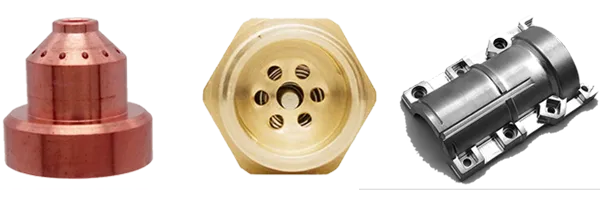Custom Online Aluminum Fabrication Services
Upload your CAD files to get an instant online aluminum fabrication quote on custom prototypes and production parts. Lead times as fast as days and free standard shipping on all US orders.

Upload your CAD files to get an instant online aluminum fabrication quote on custom prototypes and production parts. Lead times as fast as days and free standard shipping on all US orders.

Aluminum is the most common non-ferrous metal on the market and is praised for its low density, high strength-to-weight ratio, durability, natural corrosion resistance, thermal properties, and more. FlagShip offers high-quality aluminum fabrication services for multiple industries — from automotive and aerospace to construction and electronics. Our aluminum fabrication services include: custom aluminum fabrication, CNC machining, sheet metal fabrication, precision laser cutting, finishing, and more. Our industry experience and deep understanding of manufacturing processes ensure that aluminum parts are made to customers’ specific requirements. Couple that with our vast manufacturing network and you can rest assured that your aluminum parts will meet both your schedule and the highest standards of quality.
This aluminum alloy uses magnesium as its primary alloying element. It has excellent corrosion resistance due to the lack of copper in its composition. Though 5052 cannot be heat treated, it has the highest strength of the non-heatable alloys. This alloy also has better formability than series 3 alloys. It is typically used for fuel tanks and highway and road signs.
Aluminum 5052 Properties
| Tensile Strength, Yield (MPa) | Fatigue Strength (MPa) | Elongation at Break (%) | Hardness (Brinell) | Density (g/cm^3) |
|---|---|---|---|---|
| 192 | 118 | 18 | 60-91 | 2.69 |
This is among the most “general-purpose” aluminum alloys. The primary alloying elements are magnesium and silicon and it will accept heat treatment. Bending aluminum 6061 is not recommended after it reaches high tempering levels because at that point it is likely to crack. This aluminum alloy can be used for sheet metal parts but requires some care and preparation.
Aluminum 6061 Properties
| Tensile Strength, Yield (MPa) | Fatigue Strength (MPa) | Elongation at Break (%) | Hardness (Brinell) | Density (g/cm^3) |
|---|---|---|---|---|
| 278 | 98 | 18 | 95 | 2.68 |
The aluminum fabrication process requires careful and meticulous planning to ensure products are made to exact customer specifications with no delays. At FlagShip, our first step is to review the client’s design and determine the best manufacturing methods and process flow for the project. At this stage, FlagShip collaborates with the client to ensure the critical design features are captured and achievable using aluminum fabrication techniques like CNC machining, sheet metal forming, die casting, laser cutting, plasma cutting, and more. The product’s features, requirements, geometry, and volume will determine which fabrication method is best.
